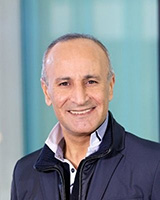Who Said mAbs Were Easy?

By Matthew Pillar, Editor, Bioprocess Online

While the first monoclonal antibody was approved for therapeutic use by the FDA way back in 1986, don’t imply to Mondher Mahjoubi, M.D., that they’re old hat, cookie-cutter, or easy.
I almost made that mistake when I suggested to him that several conversations I’ve had with the leaders of antibody therapeutics companies would lead me to believe their ease of manufacture to be an absolute. Do you keep your process and manufacturing IP close to the vest and manufacture in-house? I’ve asked dozens of times. No way, that’s too expensive and there are any number of CDMOs and CMOs that can do it for us. This industry has been making mAbs for a long, long time, they’ve replied, almost to a one.
When I shared that anecdote with Dr. Mahjoubi, he bristled a bit. “Over the last five years that I spent with Innate Pharma, we’ve faced multiple challenges in CMC and drug manufacturing because of the complexity of the antibodies we are developing. Anyone who tells you that this is like making bread is flat-out wrong,” he said.
To be fair, Innate’s most advanced asset—its candidate monalizumab targeting NKG2A — required significant investment in achieving stable supply to conduct dual phase three trials in Post-PDx head and neck squamous cell carcinoma and unresectable stage III non-small cell lung cancer in partnership with AstraZeneca.
Dr. Mahjoubi characterizes Innate’s lead proprietary candidate, lacutamab, as extremely sophisticated because it targets specific tumor antigen.
Yet another class of candidates developed from Innate’s multi-specific ANKET (Antibody-based NK cell Engager Therapeutics) platform, he says, has produced a first-of-its-kind tetra-specific molecule, IPH65, that engages two activating receptors (NKp46 and CD16), a tumor antigen, and an interleukin-2 receptor (via an IL-2 variant, IL-2v).
Prior to that, a five-year partnership with Sanofi resulted in a three-armed antibody (IPH6101) that entered the clinic last year in acute myeloid leukemia patients. “None of this was easy, and yet we added a new level of complexity by adding a fourth arm, IL-2, to expand NK cells,” explains Dr. Mahjoubi. “The preclinical step—from the time we identify the target to the time we have an antibody at lab scale—that's two-to-three years when you’re good. You could easily spend another three-to-four years on your manufacturing process, before filing an IND and starting clinical trials.”
Clearly, my observation struck a nerve. But Dr. Mahjoubi wasn’t done setting me straight.
“We’re working with some very sophisticated outsourcing partners, but COVID has had an impact on the prioritization of global manufacturing capacity,” he said. “Easy? It may be easy on paper, and it’s perhaps easy to do it at lab scale, but to go from there to GMP and produce clinical supply to treat hundreds of thousands of patients in phase 3 trials? That’s a different story.”
Expanding Resources Through Partnership
All of these challenges, both external and self-imposed by an aggressive platform enabling complex multi-specific antibodies, have honed Dr. Mahjoubi’s resilience. “The challenges we’ve faced related to CMC and other factors over the last five years have taught us a great deal, and today I'm in a much better place than I was five years ago when it comes to making manufacturing, investment and facility decisions that will enable the five-star service that we seek for our therapeutics and our patients.”
16 clinical trials are ongoing with Innate’s products, and the company has seven more preclinical programs in the pipeline. To solve the unforeseen challenges that lie ahead, it will likely rip a few pages from the playbook it’s written under Dr. Mahjoubi’s leadership. The pages on partnerships, illustrated by deals with AstraZeneca and Sanofi, will almost certainly be key among them. As he puts it, Innate will seek to continue to “mutualize resources with other companies who are interested in building the capabilities” his company is working on.
It's those kinds of partnerships that provide resource security, which can, at times, be more valuable than financial or intellectual support. Dr. Mahjoubi knows that security well. Prior to joining Innate, he served as SVP and therapeutic area head of oncology at AstraZeneca-MedImmune, SVP of global product strategy for oncology at Genentech, head of global product strategy for oncology at Roche, and VP of U.S. medical affairs for oncology at Sanofi-Aventis. “When I was in big pharmas, we didn’t struggle with a lot of those problems. We had a lot of resources, so you just asked someone to fix it, and they fixed it. In a small biotech, you have to take the lead and be hands-on when things go awry,” he says.
Addressing A Clinical Crisis
A perfect example of such hands-on problem resolution happened in January 2020, as Innate began its phase 2 TELLOMAK trial of lacutamab. Recruiting was ongoing, trial sites were open, and clinical supply production was in full swing when Rentschler Fill Solutions, one of Innate’s fill/finish providers, suddenly declared bankruptcy. The snafu resulted in an untimely, but necessary delay as Innate sought to transfer fill/finish work to another outsourcer.
A costly inconvenience, yes. But Dr. Mahjoubi says the experience was instrumental in building a strong sense of ownership among Innate associates. “The setback gave us an opportunity to demonstrate the commitment of everyone here to make it happen, no matter what. We were all aware that it impacted patients in need, and that’s what drove us to work through it efficiently.” By June of the same year, the trial was back on the rails. “It was a key lesson in resilience,” he said.
Three Inflection Points On Innate’s Horizon
A phase 3 interim readout on monalizumab, Innate’s first antibody developed against the checkpoint inhibitor expressed on NK cells and T cells, is expected later this year. That trial is studying the drug in patients with head and neck cancers. The company expects a phase 3 readout on monalizumab in non-small cell lung cancer in late 2023.
Later this year, Innate expects to offer a readout of its pivotal trial on lacutamab, which the FDA and EMA granted fast track and prime designations, respectively, in patients with Sézary syndrome, a form of cutaneous T-cell lymphoma. “This is a targeted therapy for T-cell lymphoma patients, indicated by a very specific protein on the surface of their cancer cells. Our antibody recognizes that tumor antigen and kills it,” explained Dr. Mahjoubi. “Mathematically, this represents a high need, and it means a lot to us because if the data are positive and confirm the signals we’ve seen, it will mark our first in-house drug to reach the market.”
Finally, and in keeping with Dr. Mahjoubi’s assertions on the challenges associated with manufacturing complex multi-specific antibodies, Innate anticipates an IND filing for its tetra-specific IPH65 asset as we turn the calendar toward 2023. “Starting the clinical development for this candidate would mean two things; that we’ve successfully overcome the manufacturing challenges, and that we’ll have our first proprietary tetra-specific antibody.”
